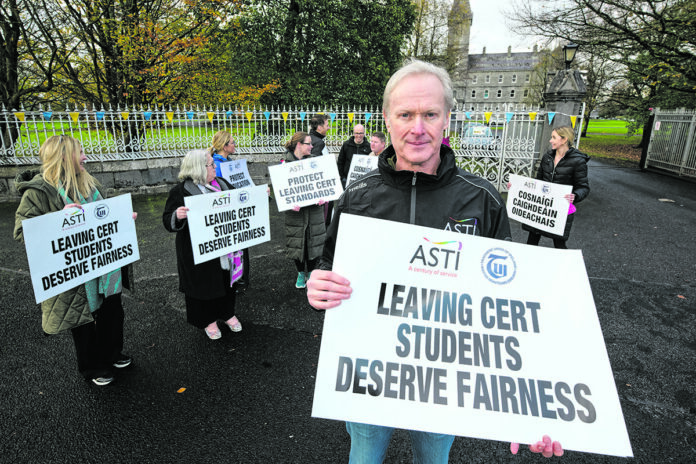TEACHERS at St Flannan’s College in Ennis joined with tens of thousands of their colleagues nationwide in staging a lunchtime protest calling for a delay in the implementation of Senior Cycle redevelopment. Some 30,000 second-level teachers took part in Tuesday’s protest organised by the Association of Secondary Teachers, Ireland (ASTI) and the Teachers’ Union of Ireland (TUI). There was no disruption to the school day and classes continued as normal on the day of action.
According to ASTI Standing Committee representative John Conneely, a teacher at St Flannan’s College they are “very concerned by the decision to accelerate Senior Cycle redevelopment; a process that involves significant change, including changes to the Leaving Cert”.
Mr Conneely is urging the county’s elected officials to “please listen to teachers’ concerns”.
In some subjects the planned introduction of an Alternative Assessment Component (AAC) could possibly be open to cheating using AI, Mr Conneely has warned, while adding that this type of assessment could “further enhance the disadvantages already facing a significant cohort of students”.
Aspects of the plans pose a threat to education standards, fairness and quality say the ASTI, and there are concerns about current system capacity to accommodate the change.
The union insists teachers are not opposed to the redevelopment of the Senior Cycle.
Mr Conneely said, “Teachers are asking that schools are allocated the required resources before the implementation of these significant changes.
“In addition, the revision of Leaving Cert subjects must not be rushed through, so as to ensure changes are educationally sound and, crucially, that Leaving Cert students can be assured of equity and fairness.”
The unions are not calling for the postponement of the new pilot subjects Drama, Film, and Theatre Studies and Climate Action and Sustainable Development.
Mr Conneely, told The Champion, “We are protesting seeking a delay in the start date of the redeveloped Senior Cycle programme, due to be implemented in schools in September 2025. Teachers have major concerns, including the inappropriate allocation of marks to the Alternative Assessment Component, or AAC for some subjects, currently set at a minimum of 40% and a max of 50%.
“By this, we mean that whilst a 40% to 50 % allocation of marks is suitable for subjects where skills are assessed directly as is the case currently in music, where a musical performance is assessed by an external examiner and the AAC is worth 50%.
“In the proposed new Senior Cycle, biology, chemistry and physics specifications, where skills are to be assessed indirectly, via a laboratory-based research report, the 40% allocation of marks is inappropriate, as the report may not be entirely the students’ own work and could even be partially or fully generated by AI, in other words it is open to cheating.
“This allocation of 40% of marks, is too much. The Irish Science Teachers Association recently presented their research on how
“AI could be used to produce such a laboratory-based research report and found that it could be awarded most of the 40% of marks after just a few minutes work.”
“Further this type of indirect assessment favours advantaged students and will serve to further enhance the disadvantages already facing a significant cohort of students, particularly in DEIS schools. In Ireland teachers traditionally act as advocates for their students and we are out protesting today and informing the public, about the inherent unfairness of this new assessment model.”
The teachers also have concerns about the “inequality of resources, availability of laboratories and availability of laboratory technicians in schools. Health and Safety, procurement and storage issues arise with 24 individual AAC science experiments running at the same time. We want commitments regarding the provision and funding of these resources”.
The unions are calling for “meaningful training” with sample examination papers and guidance to be made available a full 12 months before implementation of new syllabi.
“This will mean that the Oide training teams, who are training teachers for the new Senior Cycle will be able to adequately answer teacher questions, this is essential for the successful implementation of the redeveloped Senior Cycle programme,” said Mr Conneely.
“Something we should all want and which is a major part of ASTI and indeed TUI teacher unions policy.”
Teachers protest amid concerns over ‘speed of redevelopment’

